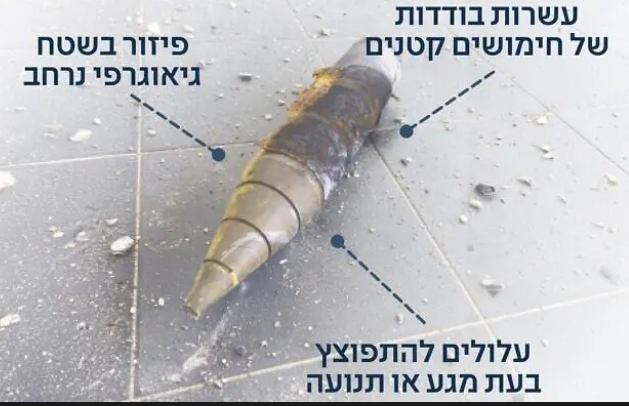Deadly Upgrade: IDF Confirms Iran Used Cluster Warhead in Central Israel Missile Strike
In a troubling escalation of missile warfare, the Israel Defense Forces (IDF) has confirmed that Iran launched a ballistic missile equipped with a cluster warhead over central Israel, a rare and dangerous development in the ongoing regional conflict.
According to The Times of Israel, the missile was one of approximately 20 fired in a wave of attacks from Iranian territory. It deployed its deadly payload at an altitude of around 7 kilometers, scattering over 20 submunitions—smaller bombs lacking propulsion—across an area spanning eight kilometers.
One of those submunitions struck a residential building in Azor, near Tel Aviv, causing localized damage akin to a small rocket explosion. While no casualties have been reported in that specific impact, officials are warning that the real danger lies in the widespread and unpredictable nature of these cluster bombs.
Full damage assessments and updated impact reports are being compiled — you can follow ongoing verified updates and citizen reactions right here.
(This is critical if you’re tracking how this new weapon tactic could shift the conflict.)
Military experts say this marks a tactical shift. “This type of warhead endangers a much broader area than a conventional missile,” an Israeli defense official warned. “It’s not just about where the missile lands—it’s about everywhere the fragments fall.”
The IDF’s Home Front Command has issued a public alert advising civilians to avoid all missile debris, warning that unexploded cluster bomblets may still detonate upon contact. People are urged to call authorities immediately if they encounter any suspicious fragments.
Despite the new weaponry, the IDF has not altered its current safety protocols. Civilians are reminded to take immediate shelter when air raid sirens sound and stay indoors until instructed otherwise.
The larger missile barrage hit multiple cities across Israel, including Beersheba, Holon, and Ramat Gan. In Beersheba, Soroka Medical Center sustained a direct hit, and dozens were injured in the coordinated strikes.
The use of cluster warheads—banned under international law by many countries due to their indiscriminate nature—raises serious concerns about future escalations and the humanitarian toll this conflict may yet take.











